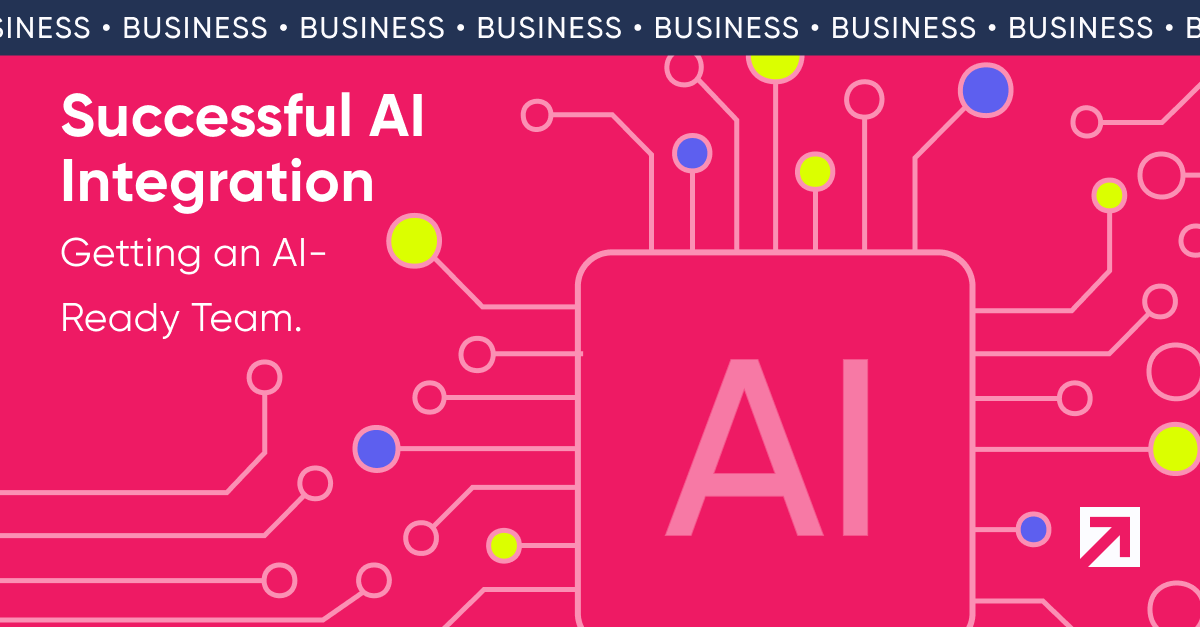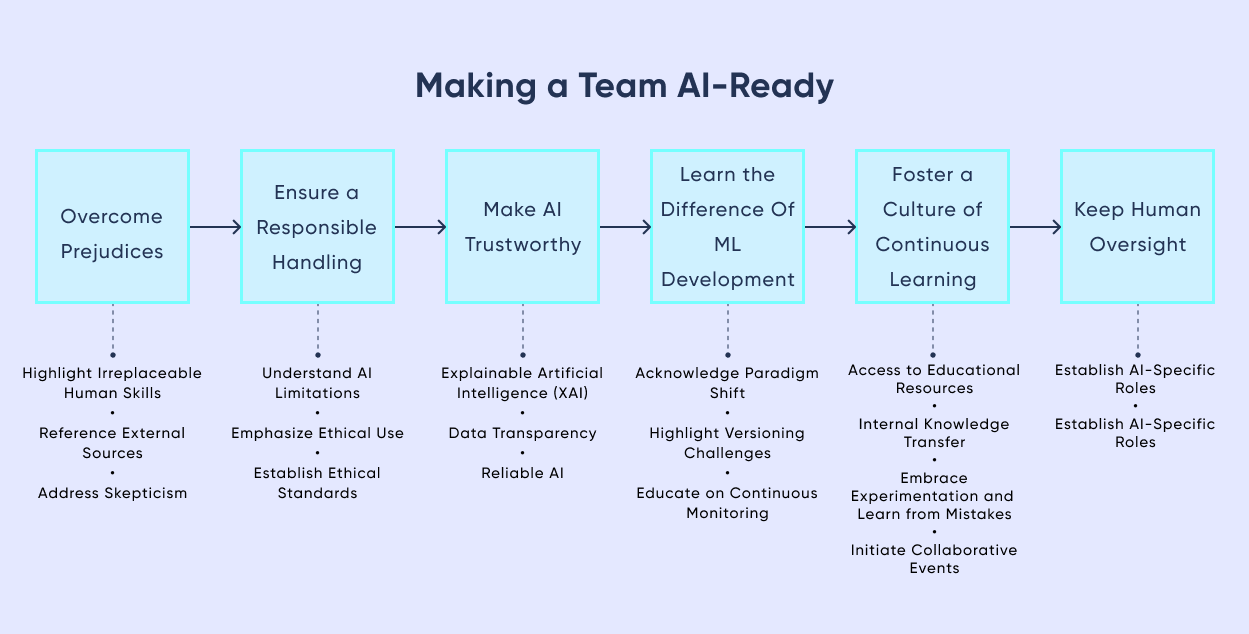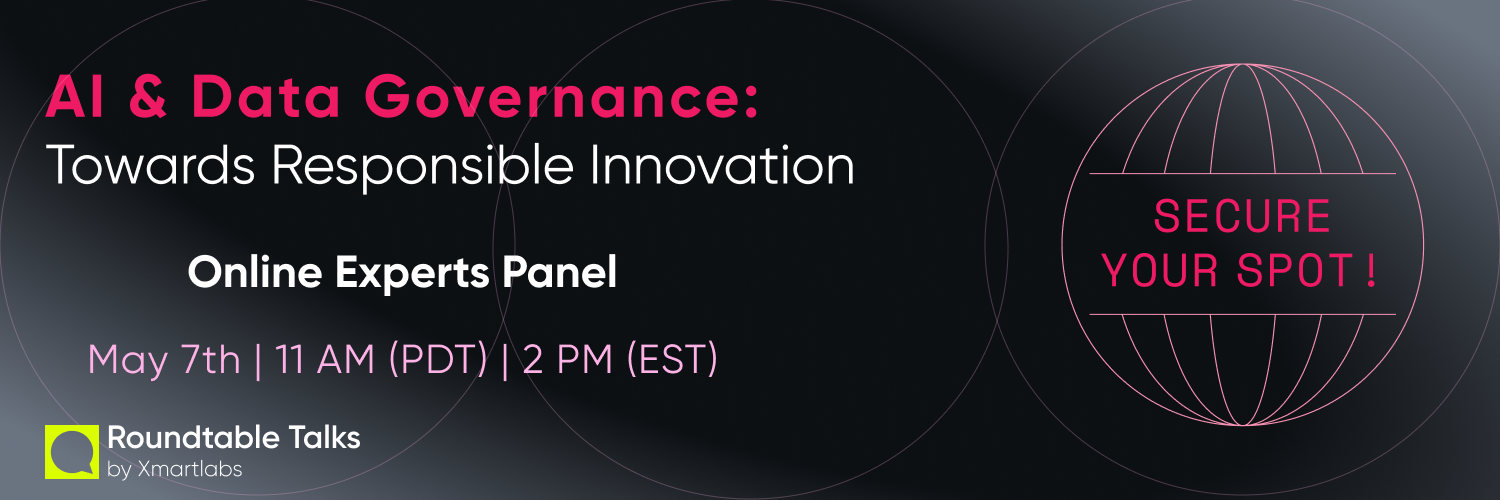

The importance and impact of artificial intelligence have been debated endlessly, and its relevance is no news. It could be argued that the present ‘hype' probably began with the release of ChatGPT in November 2022 (as the Google Trends graph reflects), and from that point up until now, companies have been speeding to hop on the wave and take advantage of the tech that's here to revolutionize the world and, with it, your business.

Source: Google Trends
And why wouldn't you want to incorporate AI? A recent Deloitte report stated, "Enterprises with an AI strategy are 1.7 times more likely to achieve their goals than those without such a vision”. 1 and According to research carried out by the Massachusetts Institute of Technology, almost 85% of executives believe AI will provide and sustain their company's competitive advantage. 2
Yet, it's not merely a matter of desiring or incorporating AI into your workflow; it's about how willing and prepared your team is to embrace and harmonize with it. It's like getting a new musical instrument—owning it is one thing, but knowing how to tune it, play the melodies, and orchestrate its full potential is another. The businesses that will excel will be those that know how to use AI efficiently.
After conducting thorough research and engaging in extensive discussions with our experts, we've compiled a list of key aspects for you to consider when preparing your team to embrace this powerful technology, regardless of your industry or area of expertise. In the following sections, we will delve deeper and offer valuable insights and advice.
Overcome Prejudices
Like every topic under the sun, AI is not welcomed unanimously by everyone, and just like it has fierce supporters, there are also people feeling the exact opposite. There might still be team members looking at AI suspiciously, and this is not only true for those working in non-tech-related industries; even software developers or tech-savvy individuals might have hesitancies when incorporating AI.
To appease those voices, leaders should highlight the importance of irreplaceable human skills like empathy, context knowledge, interpersonal relationships, specific knowledge, etc. This HBR article said it best with this metaphor: when a plane is undergoing abnormalities, the autopilot comes off and is the pilot who “holds the rains” in times of crisis. The world is also, by some accounts, unpredictable (because human beings are), and in an ever-changing world, there are dynamics that past data (what feeds AI) can’t possibly know (did someone predict COVID's length and impact?).
So make sure your team can think of AI as a complement, an assistant, a way of enhancing our work and augmenting human skills and decision-making processes. It has already been said that AI won't replace humans. AI-knowledgable humans will replace those without AI knowledge (HBR), so prepare your team for this reality.
Ensure a Responsible Understanding/Handling of AI
Just as some may be doubtful about adopting AI, others may be too willing to trust it blindly. It's crucial to understand its limitations as well as its potential. AI is not here to replace humans (at least not yet), and despite its limitations, AI models are only as good as the humans who make them and the data they feed them.
So, it's up to people to use them ethically and transparently. How? For example, maintaining the integrity of algorithms by openly sharing how they train AI models and the information influencing their decisions. Clear ethical standards should also be in place to ensure your algorithms comply with applicable laws or regulations.
Knowing how to handle sensitive data becomes key at this point. Team members must interpret and label this data before feeding it into an algorithm and learn to recognize potential biases in their datasets so that they can adjust accordingly, etc.
Make AI Trustworthy
People (and teams) fear what they don't understand. According to Deloitte (2022) companies are turning to three key aspects to ensure trustworthiness when it comes to AI.
Explainable Artificial Intelligence (XAI)
XAI addresses the common black-box issue in AI technologies, ensuring transparency for both users and developers. Just as we seek explanations from teammates, understanding the algorithmic decision-making process becomes crucial. This practice enhances user trust and serves as a valuable exercise for developers, fostering a deeper understanding of their models and helping identify potential errors.
Data Transparency
Adopting transparent data collection empowers users to understand why specific information is gathered and its intended use. Allowing users control over the data they share stands in stark contrast to apps with all-or-nothing data access demands, often undermining trust.
Reliable AI
Unlike other technologies we've learned to trust and use (think of a text processor or an internet browser), AI is sometimes harder to buy into because it doesn't function linearly. AI results are probability-based, so trusting them might be challenging. A way of presenting AI as more of a science than art is to implement MLOps processes, a set of practices that streamline and automate ML models' deployment, monitoring, and maintenance.
These strategies will serve as a way to explain AI, enhance transparency, debunk myths, persuade the skeptical, and make more reliable AI along the way.
Learn the Difference Between ML Development and Classic Software Development
Incorporating machine learning (ML) models into software development marks a shift from the traditional software development lifecycle to a novel, data-centric approach. Understanding the key distinctions between these two paradigms is essential for a seamless integration process.
ML Development Model Stages:
The ML development model introduces stages distinct from classic software development. These include:
- Data Collection: Gathering relevant data sets is needed for training and validating the model.
- Data Preparation: Ensuring the collected data is refined, formatted, and ready for the learning phase.
- Model Training: Training the ML model using the prepared data to make accurate predictions or classifications.
- Model Deployment: Integrating the trained model into the software system for practical use.
- Model Management: Continuous monitoring, updating, and optimizing of the deployed model for ongoing efficacy.
Versioning Challenges
Contrasting with classic software development, where code versioning is the norm, ML development expands this practice to include versioning not only of code but also of data and models. This introduces unique challenges, requiring a dynamic approach to manage the complexities inherent in versioning multiple components simultaneously.
Understanding this fundamental shift in development models is key to successfully integrating ML into your software projects. It's not just about writing code; it's about navigating the intricate landscape of data, models, and evolving technologies. This adaptability is the cornerstone of effective ML development and AI adoption.
Foster a Culture of Continuous Learning
In the dynamic landscape of artificial intelligence (AI), fostering a culture of continuous learning is paramount for staying at the forefront of innovation. Here's how you can nurture a learning-centric environment within your team:
Access to Educational Resources
Provide team members with access to a diverse range of courses, training programs, and educational resources. Empowering them with the tools to expand their knowledge ensures they stay up-to-date with the latest developments in AI.
Internal Knowledge Transfer
Encourage internal knowledge transfer by leveraging the expertise of more experienced team members. Establishing a culture of sharing insights and experiences enhances collective proficiency and accelerates the learning curve for everyone.
Embrace Experimentation and Learn from Mistakes
Create an environment that encourages experimentation and embraces the inevitability of making mistakes. This demystifies the learning process and propels the team towards innovative solutions.
Initiate Collaborative Events
Organize initiatives such as hackathons to stimulate creativity and problem-solving. Additionally, it encourages employees to envision ways AI tools can enhance their daily tasks. This hands-on approach fuels creativity and instills a sense of ownership and curiosity within the team.
Keep Human Oversight
As we've mentioned before, AI will not replace humans, and AI can be biased and unethical if done wrongly or even left unsupervised. To avoid this, it’s important to keep people overseeing the technology.
This oversight may involve recruiting AI-specific roles dedicated to monitoring, interpreting, and ensuring the ethical and effective use of AI within your organization. Positions such as AI product managers, Data Scientists, and ML Engineers play key roles in this aspect.
However, according to a McKinsey survey, when facing the issue of sourcing AI talent “the most popular strategy is reskilling existing employees.” By investing in the development of existing team members, you harness their institutional knowledge and ensure they possess the skills required to navigate and supervise evolving AI technologies—saving valuable resources in the process.

Conclusions
AI possibilities are limitless, as we've heard a thousand times, but human capabilities are not, and it's important to have a team that's prepared to handle all the doors that this revolutionary tech will open. How well AI works in real life might depend on how much people understand and agree with what it's doing.
We recognize that reaching a point where your team is fully equipped to handle and develop AI solutions is a long-term goal. At Xmartlabs, we are here to offer ongoing guidance and assistance throughout this journey. Whether you're looking to pave the way for future internal teams or develop AI use cases tailored to your business, you can rely on our experts to support your endeavors.
With the pace at which AI changes things, it's easy to feel constantly overwhelmed or like you're lagging. Contact us to start working with our team of AI experts, who will assess your business's journey towards AI integration.
- https://www.deloitte.com/content/dam/assets-shared/legacy/docs/services/consulting/2022/DI_State-of-AI.pdf
- https://mitsloan.mit.edu/ideas-made-to-matter/how-big-firms-leverage-artificial-intelligence-competitive-advantage
💡 Learn the intricacies of AI and how to manage sensitive data responsibly to ensure safe AI innovation from leading experts!
Register now to secure your spot! ✅



